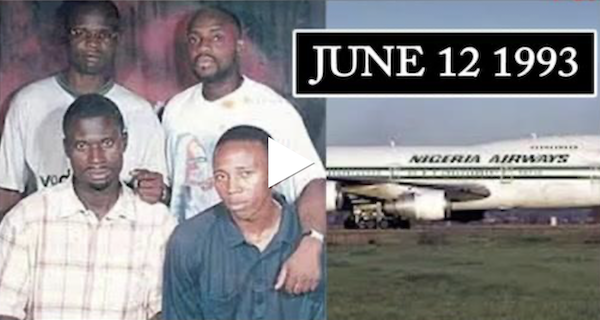

The Hijacking of Nigerian Airways Flight 1993: A Story of Desperation and Courage
Naija Right Online@naijarightonline
1 year ago
It was a routine day at Murtala Muhammed International Airport in Lagos, Nigeria. Nigerian Airways Flight 980 was scheduled to depart from Lagos to Abuja, with stops in Kaduna and Kano. Among the 150 passengers onboard, there was an air of calm as the Boeing 737 began its ascent on the sunny morning of October 25, 1993. Little did they know, the events that would unfold mid-flight would shock the nation and the world.
The Hijackers
Four young men, between the ages of 18 and 25, had been plotting an act of defiance for weeks. Their motivation was rooted in the political and economic unrest that had gripped Nigeria in the early 1990s. The recent annulment of the June 12, 1993 elections, widely regarded as Nigeria’s fairest and freest, had left the country in turmoil. The military government led by General Sani Abacha had become increasingly authoritarian, and these young men saw hijacking the plane as a way to draw international attention to Nigeria’s plight.
The leader of the group, identified as Ibrahim Abdullahi, was a student who had been radicalized by the events in Nigeria. He and his accomplices—Musa Kanu, Mohammed Saleh, and Ismaila Zubairu—were determined to make their voices heard. Armed with concealed weapons, they boarded the plane in Lagos with a single mission: to divert the flight to Niamey, Niger, where they hoped to negotiate their demands.
The Hijack
Approximately 30 minutes into the flight, the situation took a terrifying turn. Ibrahim stood up and walked toward the cockpit, followed by his accomplices. Brandishing their weapons, they forced the pilots to change course and announced the hijacking to the stunned passengers. Panic spread like wildfire through the cabin as the passengers realized they were at the mercy of four desperate men.
The hijackers explained their demands: they wanted Nigeria’s political instability to be addressed, the military junta to step down, and for the international community to intervene. They threatened to kill passengers one by one if their demands weren’t met. The atmosphere in the cabin was tense. Passengers sat in fear, wondering if they would ever see their families again.
Negotiations and Fear
As the flight veered off course, Nigerian authorities were alerted to the hijacking. A team of negotiators and security personnel was quickly assembled. In a desperate bid to avoid bloodshed, they reached out to the hijackers via radio communication. The hijackers repeated their demands and threatened to execute the pilots if the plane was forced to land in Nigeria.
The aircraft, now dangerously low on fuel, was allowed to land in Niamey, where negotiations continued on the tarmac. The Nigerien authorities, in coordination with Nigerian officials, tried to reason with the hijackers. Food and water were sent to the plane as a sign of goodwill, and hours passed as the standoff dragged on.
Inside the plane, passengers were trying to stay calm. Some prayed quietly, while others sobbed. A few courageous individuals tried to comfort those around them, offering quiet words of hope. Among them was a young mother traveling with her infant, her eyes filled with fear but her hands steady as she rocked her baby.
The Endgame
As the hours wore on, the hijackers realized they were running out of options. They had made their point, but there was no international intervention, and their demands were unlikely to be met. Tensions between the hijackers and the negotiators reached a breaking point when Nigerian security forces decided to storm the plane in a daring raid, hoping to minimize casualties.
In a swift and well-coordinated operation, Nigerian and Nigerien security personnel boarded the plane under the cover of darkness. Shots were fired, and in the chaos that ensued, one of the hijackers, Musa Kanu, was killed. The remaining three hijackers were quickly subdued and taken into custody. The passengers, though traumatized, were unharmed.
Aftermath
The hijacking of Nigerian Airways Flight 980 was over, but the impact of the event would be felt for years. The hijackers were tried in a Nigerian court, and the surviving members of the group were sentenced to long prison terms. The incident sparked a national conversation about the political unrest in Nigeria and the growing dissatisfaction with the military government.
For the passengers, it was a harrowing experience that would live with them forever. Many spoke of the bravery of their fellow passengers and the professionalism of the pilots who had remained calm under unimaginable pressure.
